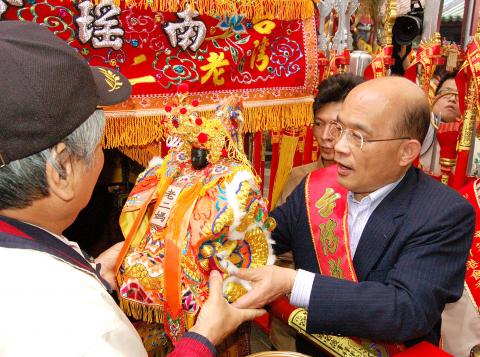In remarks certain to rankle with the Democratic Progressive Party (DPP), democracy activist and former party chairman Shih Ming-teh (施明德) yesterday accused the party’s two frontrunners for presidential candidate of “lacking leadership material.”
In a meeting with Hsu Hsin-liang (許信良) at Shih’s residence in New Taipei City (新北市), Shih endorsed Hsu, who is trailing heavily in the primaries. Shih and Hsu were key players 30 years ago in Taiwan’s fledging democracy movement that eventually led to the creation of the DPP.
“Hsu is far-sighted and the ideal candidate for president,” said Shih, who was DPP chairman between 1994 and 1996.

Photo: Tang Shih-ming, Taipei Times
Hsu, who headed the party in 1993, raised his profile with remarks in support of closer cross-strait ties during the first two DPP policy sessions with Tsai Ing-wen (蔡英文) and Su Tseng-chang (蘇貞昌), the top contenders for the party nomination.
“Hsu knows the problems Taiwan is facing today,” Shih said. “He has forced Tsai and Su to respond to tough questions on cross-strait issues and the Economic Cooperation Framework Agreement.”
The two were involved in the street protests that led to the Kaohsiung Incident in 1979, recognized as a democratic milestone for the nation. Shih served a 10-year sentence while Hsu fled abroad, where he continued to publish pro-Taiwan articles.
However, the pair have a turbulent history with the party, giving up their membership during Chen Shui-bian’s (陳水扁) administration. Shih later led hundreds of thousands in street protests in Taipei against alleged corruption by Chen.
Shih said both Tsai and Su did not play any key roles in Taiwan’s democracy movement in the 1970s and 1980s. Not a “single one” of the key democratic trailblazers, such as himself, later assumed high-level government roles, he said.
“I know that one day, perhaps in a 100 years, history will remember us over people like presidents Ma Ying-jeou (馬英九), Chen Shui-bian and Lee Teng-hui (李登輝),” he said.
“After watching [Wednesday’s] debate ... I feel that while Su might be a good minister or mayor, I don’t think he has what it takes to be president,” Shih said.
Responding to the comments, Lee Hou-ching (李厚慶), a campaign spokesperson for Su — who was a lawyer for the defendants in the Kaohsiung Incident — said Su “expressed his gratitude for the advice,” but refused to elaborate.
Shih said Tsai was still “too unknown and unfamiliar. She’s only been in the DPP for seven years.”
At a separate setting later in the day, Shih called on Tsai, who is single, to clarify her sexual orientation, saying voters deserved “a clear answer” before voting her.
Tsai’s campaign office was unavailable for comment.
Shih and Hsu denied that they were aligned with the Chinese Nationalist Party (KMT).

A small number of Taiwanese this year lost their citizenship rights after traveling in China and obtaining a one-time Chinese passport to cross the border into Russia, a source said today. The people signed up through Chinese travel agencies for tours of neighboring Russia with companies claiming they could obtain Russian visas and fast-track border clearance, the source said on condition of anonymity. The travelers were actually issued one-time-use Chinese passports, they said. Taiwanese are prohibited from holding a Chinese passport or household registration. If found to have a Chinese ID, they may lose their resident status under Article 9-1

Taiwanese were praised for their composure after a video filmed by Taiwanese tourists capturing the moment a magnitude 7.5 earthquake struck Japan’s Aomori Prefecture went viral on social media. The video shows a hotel room shaking violently amid Monday’s quake, with objects falling to the ground. Two Taiwanese began filming with their mobile phones, while two others held the sides of a TV to prevent it from falling. When the shaking stopped, the pair calmly took down the TV and laid it flat on a tatami mat, the video shows. The video also captured the group talking about the safety of their companions bathing

PROBLEMATIC APP: Citing more than 1,000 fraud cases, the government is taking the app down for a year, but opposition voices are calling it censorship Chinese Nationalist Party (KMT) Chairwoman Cheng Li-wun (鄭麗文) yesterday decried a government plan to suspend access to Chinese social media platform Xiaohongshu (小紅書) for one year as censorship, while the Presidential Office backed the plan. The Ministry of the Interior on Thursday cited security risks and accusations that the Instagram-like app, known as Rednote in English, had figured in more than 1,700 fraud cases since last year. The company, which has about 3 million users in Taiwan, has not yet responded to requests for comment. “Many people online are already asking ‘How to climb over the firewall to access Xiaohongshu,’” Cheng posted on

A classified Pentagon-produced, multiyear assessment — the Overmatch brief — highlighted unreported Chinese capabilities to destroy US military assets and identified US supply chain choke points, painting a disturbing picture of waning US military might, a New York Times editorial published on Monday said. US Secretary of Defense Pete Hegseth’s comments in November last year that “we lose every time” in Pentagon-conducted war games pitting the US against China further highlighted the uncertainty about the US’ capability to intervene in the event of a Chinese invasion of Taiwan. “It shows the Pentagon’s overreliance on expensive, vulnerable weapons as adversaries field cheap, technologically